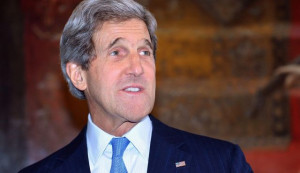
U.S. labor rules require that a babysitter be paid $9.75 an hour. Khobragade paid Sangeeta Richard merely a third of the required amount. Maybe a crime was theoretically committed, in the home of unfettered free market capitalism, but that is hardly a reason for publicly arresting a diplomat when there are plenty of American households doing the same.
Regardless of the ledger of guilt or innocence, the question remains what message was being sent to the Indian government by the United States, and how the wider diplomatic community is supposed to interpret it. Clearly they are not supposed to believe that America wants foreign ambassadors to abide by its labor codes, as it makes no attempt to introduce internationally accepted labor standards in the countries where it effectively controls the government.
We are back to the days of the 1950s, when the United Nations was established in New York, to show how important America was, and the first Secretary General was then charged with filling the place with communists. There were many communist countries then, you couldn’t avoid receiving their diplomats. This sort of hypocrisy is the main reason the Cold War and communism lasted as long as they did.
Devyani Khobragade didn’t actually have full diplomatic immunity, but that is beside the point. She was arrested in a show of publicity, which the US must have known would follow, processed as a hardened criminal and tossed in with the standard prison population. Khobragade was stripped searched and cavity searched. Now the US denies this, but it happened. What relevance such searches have to do with underpaying a babysitter is for the rest of the world to guess.
According to Gopalaswami Parthasarathy, the U.S. handling of the affair was “outrageous”. He added in a recent interview that “there was no reason to treat Khobragade so harshly, unceremoniously and the Indian government’s retaliatory action is in step with public opinion at home.”
On the surface the incident could not have come at a worse time for the US, which is changing its policy towards India and China, seeing their region as the next to be brought under US domination. However it sends a signal consistent with its new position. America is your friend if you obey its rules. Start listening to other friends and you will suffer the consequences.
India has always maintained that Khobragade’s status in the US, as an adviser to India’s U.N. mission, affords her diplomatic immunity. However that term cuts both ways. It has long been reported in the Western media that diplomats from various countries are smuggling arms and other contraband in their diplomatic bags, which can’t be searched. If you are a diplomat and “foreign”, underpaying the babysitter might be the tip of the iceberg.
Pundits in India are, of course, looking for the deeper motivations behind the incident, so that they can draw the conclusions the US wants them to and think they are their own idea. India has always been a problem as far as the US is concerned. It has longstanding links with the Soviet Union and now Russia, involving arms, nuclear technology and positive trade relations. America doesn’t like its allies talking to the so-called post-Cold war enemy. India carries on doing it because it respects proper boundaries and can turn these relations to its advantage. America can’t, and that’s what it doesn’t like. You can’t be better than the US of A and get away with it.
India has positive relations with the US too. Aside from the many call service jobs now outsourced to India, the US and India had a $86 billion mutual trade turnover last year. Politicians of all shades are now nevertheless questioning the unconditional pro-American stance India has always adopted politically. This is an election year in India. Few who stand for office are going to be too pro-American when this is how America treats their diplomats. The USA may soon discover that sending a message to India may have far worse geopolitical consequences than it intended.
The incident has been a windfall for the BRICs countries, Brazil, Russia, India and China. The message was meant for them all, and especially China, which been the focus of much American rhetoric in recent years. China has the same problem – it does the wrong thing, from a US point of view, and it works. Now the BRICs countries, long lectured by the US, can claim the moral high ground. Will they now start lecturing the US in their turn, and demanding partnership on terms more favorable to themselves?

At least the hired help working for Indian diplomats will be paid the going rate as a result of this diplomatic showdown, or perhaps not. It would be difficult to find many people, diplomats or not, who pay almost 10 dollars an hour for domestic help these days, especially when so many unemployed Americans are willing to work for less. Arresting a foreign diplomat, publicly branding them as “not one of us”, won’t change that. The diplomat isn’t innocent. She claimed in court documents that she was paying her female nanny $4,500 per month, when in reality she received only $573 monthly, a measly $3.31 an hour. But the international furor which has followed the arrest confirms that everyone is aware that this matter has nothing to do with paying the minimum wage.
The Indian diplomat was indicted after being granted immunity and asked to leave the United States, which she did. Technically the charges are still pending. But now Secretary of State John Kerry has stepped in, expressing regret over the affair. Usually a government trumpets its success when it removes criminals from its shores. Kerry is trying to save face, which would be easier if he didn’t have so many of them.
When the arrest became known India transferred Khobragade to a position giving her full diplomatic immunity, allegedly to protect her from further criminal proceedings. Much has been made of this in some quarters. But little is ever said about the US demanding diplomatic immunity for its contract employees, CIA operatives, in the same way.
Khobragade’s treatment at the hands of US law enforcement can be regarded as sexual abuse under American law. Kerry’s expression of regret was carefully designed not to be an apology. The idea of an educated, middle class woman being given a strip and cavity search is anathema in India. If she is breaking American laws you send her a note telling her so, and ask her to correct matters, not this.
The whole concept of strategic partnership is to find ways of maximizing your relations with countries which sometimes oppose your positions. India not only works with countries the US doesn’t like but does it more successfully than the US does. That is its crime, not sending diplomats to feed the babysitter yesterday’s leftover curry. Now India’s economic success threatens US positions the superpower has to lay down the law. Play by our rules or be hit. In a strategic partnership the rules are agreed by all sides. That means you sometimes have to learn, not always teach.
The US does not want to learn from India, and to justify this it brands its representatives as criminal for doing what is commonplace in the US. Would it not be better to learn than destroy a strategic partnership, and all the good it can do, for $9.75 an hour?
Henry Kamens, columnist, expert on Central Asia and Caucasus, exclusively for the online magazine “New Eastern Outlook”.
